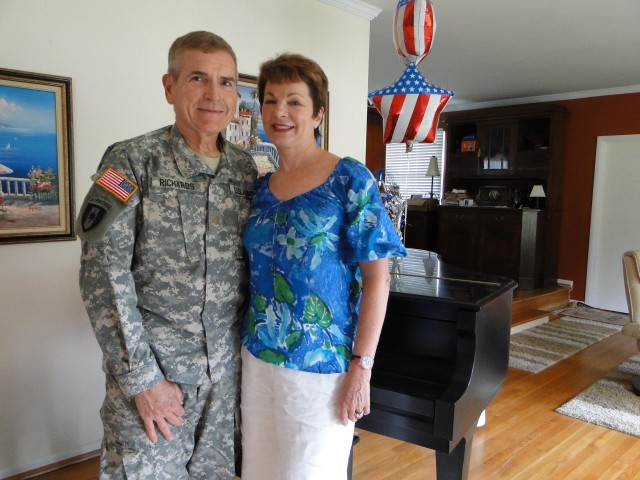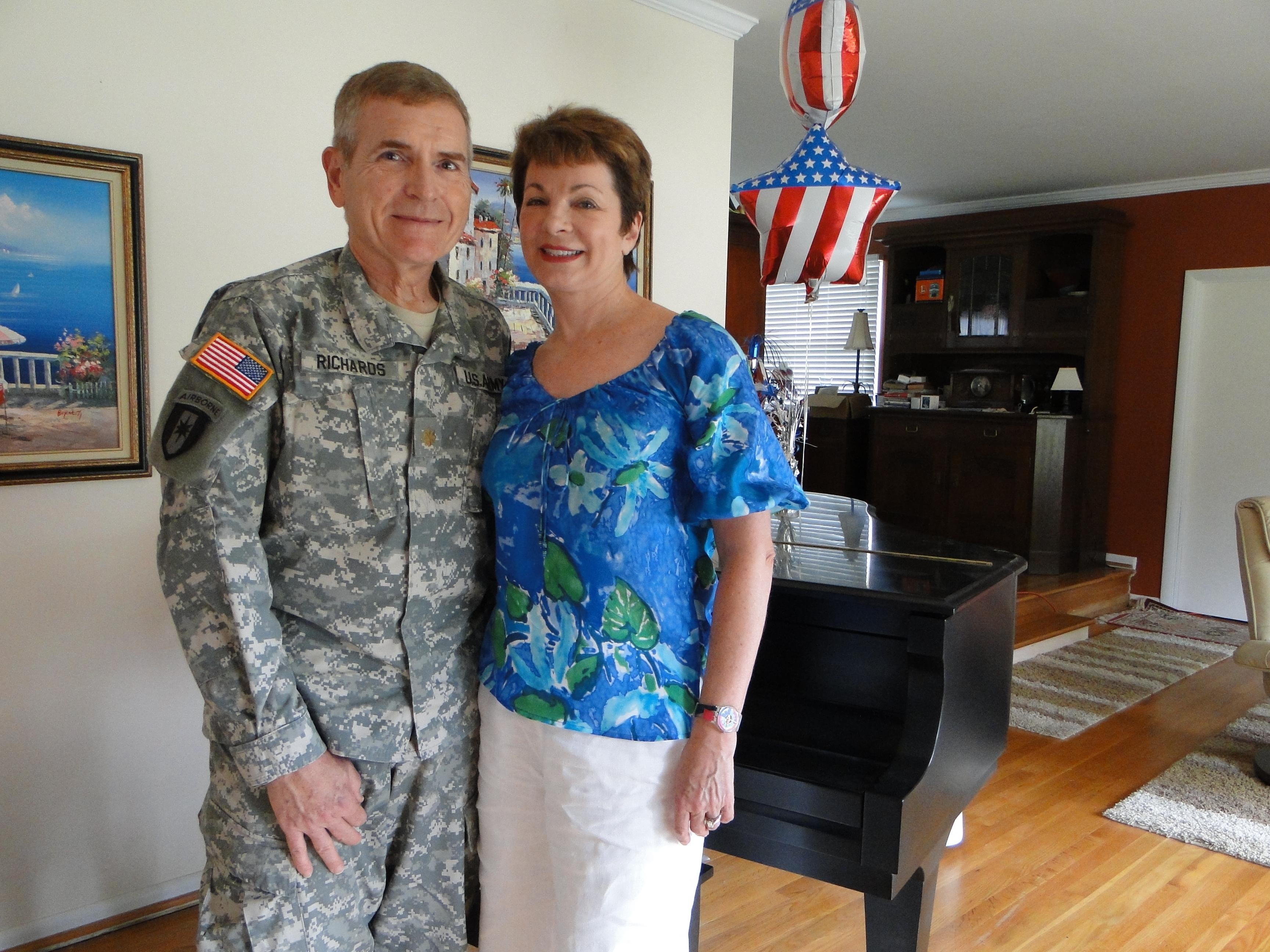
When retired Maj. Jim Richards returned to uniform in May 2008 under the voluntary retiree mobilization and recall program, he expected to be deployed in a support role to younger Soldiers serving in Operation Iraqi Freedom or Operation Enduring Freedom.
He didn't expect to be charged with a command for the first time in his five decades of service.
But that's exactly what happened to this now 61-year-old Iraqi war veteran, who returned to active duty after 15 years in military retirement.
"I was company commander of Headquarters and Headquarters Company of the 44th Medical Command in Iraq," Richards said. "In that role, I commanded about 125 Soldiers. Most of the work involved personnel duties, providing information, making sure Soldiers had what they needed to do their job in support of hospital facilities, handling quality of life issues for the Soldiers, and enforcing rules and regulations.
"The day-to-day mission was to provide the support so that our Soldiers could do their job with the subordinate units."
The 44th MEDCOM, which deployed to Iraq in September 2008 and returned July 3, provided medical care and support to more than 320,000 members of U.S., coalition and Iraqi forces, as well as care for the more than 120,000 civilian contractors in theater. It provided personnel for seven hospitals, and ambulatory, dental and veterinarian clinics.
Under Richards' command, the 44th's HHC included several officers, such as the chief veterinarian, dentist and nurse as well as 10 colonels and six lieutenant colonels.
"We had quite a mix. Our youngest Soldier was 18 and the oldest was probably me," Richards said, smiling.
Originally, Richards was assigned as a chemical officer to the 44th Medical Command, stationed at Fort Bragg, N.C. Richards wasn't anticipating a lot of demand for his chemical training, so he expected to be involved in plans and operations shift work in a tactical operations center in Baghdad.
"We ended up with two chemical officers assigned to Headquarters and the mission for chemical personnel didn't provide enough work to keep even one of us busy," Richards said. "There was a lieutenant colonel commanding Headquarters, but he left at the last minute. They needed a replacement quickly. So they decided to take someone within the command, and I was it."
Richards has served with both the Navy and Army. He joined the Navy in 1969 and served as a medic. He left the service in 1973 to attend college, during which he joined the Army ROTC program in 1975. He retired from the Army in 1993, after a career that included stints as an ordnance officer and a chemical officer.
Richards' seniority and experience made him the standout choice for HHC commander, even though it was his first time in a command position.
"It was a big challenge and I kind of had a steep learning curve not only because it was a command position but also because I was coming back to the Army after 15 years," he said.
"I received a lot of support from the MEDCOM staff and I had a lot of senior Soldiers in the company who helped me get up to speed on everything. They all knew it was a two-way street, that they would have to support me so I could support them."
Richards' matter-of-fact style combined with his dedication to serve also helped him more easily assume command.
"Because I was a little more senior, I tended to get less upset about things," he said. "My philosophy is that it's easier to reason with someone than it is to confront them."
The job, though busy, was not challenging in a physical sense.
"We didn't have physical training or formations because we were providing 24-hour force protection," Richards said. "Instead, we did PT in groups or sections of six to eight people. There is still too much danger there to do anything in large groups. Terrorism is still much a part of the environment and the streets are always crowded.
"I also wasn't part of the units that went on all-day patrols in convoys or foot patrols and who were wearing body armor in 110-degree heat."
The 44th was stationed at Camp Victory, a large compound adjoining Baghdad International Airport. Camp Victory, one of several U.S. military installations surrounding the airport, includes the Multi-National Force-Iraq headquartered in Saddam Hussein's Al Faw Palace.
"I was there when President (Barack) Obama visited," Richards said. "We had a dining facility and fitness center, and lots of other MWR offerings. It was, for us, pretty much like being in the states, only it was dusty and we didn't get to go home at night and we had to carry our weapons.
"The living conditions were pretty good for living in a war zone. The food was good. The accommodations were good. We had laundry service. We had tours like (American Idol's) Bo Bice and David Cook come through and there was world famous wrestling, and visits from the Oakland Raider cheerleaders, and college and NFL coaches. There was a lot of entertainment that came through."
Richards was there in November when then President George Bush visited Camp Victory and then later for Obama's visit.
He was also there as the U.S. started making troop drawdowns.
"There was a time when our compound was really filling up with Soldiers because of the withdrawal of U.S. troops from cities. Those troops were brought back to Victory base." Richards said.
"A lot has changed because of the change in policy. Iraqis are now taking control of the green zone. Lots of U.S. personnel are being moved back to the states. You can see changes every day in Iraq. They started with President Bush and continued under President Obama. The policy toward Iraq was pretty much set and agreed to with the Iraqis before I even got there. Now, the bigger changes are in Afghanistan."
Because his movements were limited to "inside the wire," Richards was fairly isolated from the threat of terrorism and improvised explosive devices.
"I was in more danger of tripping and falling after dark or being hit by a vehicle than I was of anything else," he said. "Three or four times we had indirect fire attacks and the sirens sounded and we had to go for cover. Sometimes we would hear car bombs go off in Baghdad. But there was nothing that hit close to us."
While no one in Richards' compound was injured "inside the wire," others were. Two doctors were killed at a nearby compound by random and direct fire.
Though relatively safe from terrorism attacks, being confined to "inside the wire" did cause some issues with feelings of isolation and confinement.
"I missed not being able to drive my Mustang. I missed not being able to go more than a couple miles in any direction," Richards said.
Richards also missed his wife, Angela, and his family. The couple did, however, enjoy Richards' 15-day R&R on a vacation in Bavaria, Germany. And they stayed in almost daily contact during the deployment through e-mails and phone calls.
"One time I went out to the Arsenal to use the video teleconference system so that we could see and talk to each other," Angela Richards said. "But it was bittersweet. I was so excited going out to the Arsenal to see him. But on the way home I missed him so much that I wanted to cry."
There were lots of care packages, thank you cards and letters from children during Richards' deployment.
"Churches, civic organizations, my friends and my co-workers at Teledyne Solutions sent us lots of care packages," he said. "We received T-shirts, toiletries, food, coffee, books, videos and almost anything you can think of. The support was great. I want to let everybody know we got their care packages and we appreciated them very much."
Richards is now home during three weeks of leave. He will remain on duty at Fort Bragg as the 44th's Headquarters Company commander until May 2010 or until the Army releases him from his assignment.
"I want to finish out my tour," he said. "But the Army changes and their needs change, so it's possible they could release me sooner."
When he does return to the civilian world, Richards will resume his work with Teledyne Solutions on the Arsenal, where he works for AMCOM's G-4 office in environmental support to aviation and missile programs.
"I don't regret doing this. It was a good adventure. I wanted to serve and support the Soldiers who are deployed over there," Richards said. "But I don't know if I would turn around and do it again.
"It was maybe a bigger strain on me and my family than I probably anticipated. But we had some Soldiers in our unit who were on their fourth or fifth deployment. What a tremendous strain that must be on their family life. Some were in new marriages or had young children at home. Maybe my deployment kept one other from having to leave their family one less time."

Social Sharing